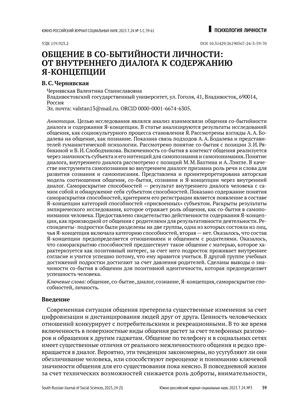Abstract
The aim of the study was to analyze the relationship between the communication of co-existence and dialog and self-concept content the content of self-concept. The article presents research results on communication as a sociocultural process of self-formation. A. A. Bodalev’s views on communication as cognition are discussed. The connection between the approaches of A. A. Bodalev and representatives of humanistic psychology is shown. The concept of co-existence from the position of Z. I. Ryabikina and V. I. Slobodchikov is examined. The inclusion of co-existence in the context of communication is realized through the significance of the subject and its intents for self-knowledge and self-understanding. The concept of dialog, internal dialog, is examined from the positions of M. M. Bakhtin and A. Langlais. The role of speech and words for the development of consciousness and self-description is recognized as a tool of self-knowledge in inner dialogue. The author’s model of the correlation between communication, co-existence, consciousness and self-concept through internal dialog is presented and interpreted. Revealing one’s abilities is the result of an internal dialog and discovering oneself as the subject of those abilities. The content of the concept of self-disclosure of abilities is shown. The criterion of its registration is the appearance of categories of abilities “appropriated” by the subject in the composition of the self-concept. The results of an empirical study that reflects the role of communication as a co-existence in human self-understanding are presented. The presented evidence suggests that the content of the self-concept that is derived from communication with parents can improve performance. The adolescent respondents were divided into two groups, one of which consisted of individuals whose self-concept included the ability category, while the other did not. It appeared that the composition of self-concept was predetermined by the relationship and communication with parents. It has been found out that self-disclosure of abilities is preceded by such communication with the mother, which is characterized as a positive interest, at the expense of which the adolescents live internal harmony and learn successfully because they like to learn. In another group, adolescents achieve academic success because of parental pressure. Conclusions are drawn about the importance of coexistence in communication for positive identity, which predetermines a person’s success.
Keywords
References
- Akopov, G. V. (2022). Novoye ob’’yasneniye soznaniya: podhod M. Gratsiano [New Explanation of Consciousness: The Approach of M. Graciano]. Psihologiya. Zhurnal Vysshey shkoly ekonomiki [Psychology. Journal of the Higher School of Economics], 1, 169–182. DOI: 10.17323/1813-8918-2022-1-169-182
- Bahtin, M. M. (1963). Problemy poetiki Dostoyevskogo [Problems of Dostoevsky’s Poetics]. Moskva: Sovetskiy pisatel’.
- Berns, R. (1986). Razvitiye Ya-kontseptsii i vospitaniye [Development of Self-concept and Education]. Moskva: Progress.
- Bodalev, A. A. (1995). Lichnost’ i obshcheniye [Personality and Communication]. Moskva: Mezhdunarodnaya pedagogicheskaya akademiya.
- Bodalev, A.A. (1970). Formirovaniye ponyatiya o drugom cheloveke kak lichnosti [Formation of the Concept of Another Person as a Person]. Izd-vo Leningradskogo un-ta.
- Bodalev, A.A. (1996). Psikhologiya obshcheniya [Сommunication Psychology]. Moskva: Izdatel’stvo “Institut prakticheskoy psikhologii”; Voronezh: NPO MODEK.
- Brushlinskiy, A. V. (2003). Psikhologiya sub’’yekta [Psychology of the subject]. Moskva: Institut psikhologii, Rossiyskaya akademiya nauk.; SPb.: izdat.”Aleteyya”.
- Chernyavskaya, V. S. (Ed.) (2021). Samoraskrytie sposobnostey: ponyatie, osnovnye funktsii i usloviya razvitiya. [Self-disclosure of Abilities: Concepts, Main Functions, and Conditions for Development]. In Samoraskrytiye sposobnostey kak vnutrenniy dialog: kognitivnye, metakognitivnye i ekzistentsial’nye resursy cheloveka [Self-disclosure of Abilities as Internal Dialogue: Cognitive, Metacognitive, and Existential Resources of a Person] (pp. 8–18). Vladivostok: Vladivostokskiy gosudarstvennyy universitet ekonomiki i servisa.
- Lenglet, A. (2018). Chto dvizhet chelovekom? Ekzistentsial’no-analiticheskaya teoriya emotsiy [What Drives a Person? Existential-Analytic Theory of Emotions]. Moskva: Genezis.
- Lenglet, A. (2018). Person. Ekzistentsial’no-analiticheskaya teoriya lichnosti [Person. Existential-analytical theory of personality]. Moskva: Genezis.
- Leont’yev, A. A. (1999). Psikhologiya obshcheniya [Psychology of Communication]. M.: Smysl.
- Luriya, A. R. (2020). Yazyk i soznaniye [Language and Consciousness]. Sankt-Peterburg: Izdatel’stvo: Piter.
- Malakhova, V. R., Chernyavskaya V. S., Osadcheva I. I. (2020). Parental Attitude and Self-Diclosure of a Teenager’s Abilities. In Amurcon 2020: International Scientific Conference: Proceedings of the International Scientific Conference (pp. 619–626). Birobidzhan: European Publisher.
- May, R. Angel E., Ellenberger, H. F. (1958). The Origins and Significance of the Existential Movement in Psychology. In A New Dimension in Psychiatry and Psychology (pp.3–36). N.-Y.: Basic books.
- Potebnya, A.A. (1999). Mysl’ i yazyk [Thoughts and Language]. Moskva: Izdatel’stvo “Labirint”.
- Rodzhers, K. (1994). Vzglyad na psikhoterapiyu. Stanovleniye cheloveka [On Becoming a Person: A Therapist’s View of Psychotherapy]. Moskva: Progress.
- Ryabikina, Z. I. (2020). Inoy mir, inoy chelovek, inaya psikhologiya lichnosti [Another World, Another Man, Another Psychology of Personality]. In Lichnost’ i vyzovy sovremennosti: interpretatsiya problem razlichnymi nauchnymi shkolami [Personality and Challenges of Our Time: Interpretation by Different Scientific Schools] (pp. 64–69). Maykop–Krasnodar: Adygeyskiy gosudarstvennyy universitet, Kubanskiy gosudarstvennyy universitet.
- Ryabikina, Z. I. (2022). NBIK-konvergentsiya i psikhologicheskiye problemy lichnosti v novom kommunikativnom prostranstve [NBIK-Convergence and Psychological Problems of Personality in New Space of Communication]. In Obshcheniye v epokhu konvergentsii tekhnologiy [Communication in The Era of Convergence Technology] (pp. 52–55). Moskva: Psikhologicheskiy institut Rossiyskoy akademii obrazovaniya.
- Slobodchikov, V. I. (2000). Osnovy psikhologicheskoy antropologii. Psikhologiya razvitiya cheloveka [Fundamentals of Psychological Anthropology. Psychology of Human Development]. Moskva: Shkol’naya Pressa.
- Slobodchikov, V. I. (2016). Psikhologiya stanovleniya i razvitiya cheloveka v obrazovanii [Psychology of Human Formation and Development]. Vestnik Sankt-Peterburgskogo universiteta. Seriya 16. Psikhologiya. Pedagogika [Vestnik Sankt-Peterburgskogo universiteta. Seriya 16. Psihologiya. Pedagogika], 1, 100–108.
- Vygotskiy, L. S. (2005). Psikhologiya razvitiya cheloveka [Psychology of Human Development]. M.: Izd-vo Smysl; Eksmo.
- Znakov, V. V. (2022). Psikhologiya vozmozhnogo: Novoye napravleniye issledovaniy ponimaniya [Psychology of the Possible: a New Direction of Understanding Research]. Moskva: Institut psikhologii, Rossiyskaya akademiya nauk. DOI: 10.38098/prgrs_22_0447
- Znakov, V. V., Ryabikina, Z. I. (2017). Psikhologiya chelovecheskogo bytiya [Psychology of Human Existence]. Moskva: Smysl.
 Русский
Русский


